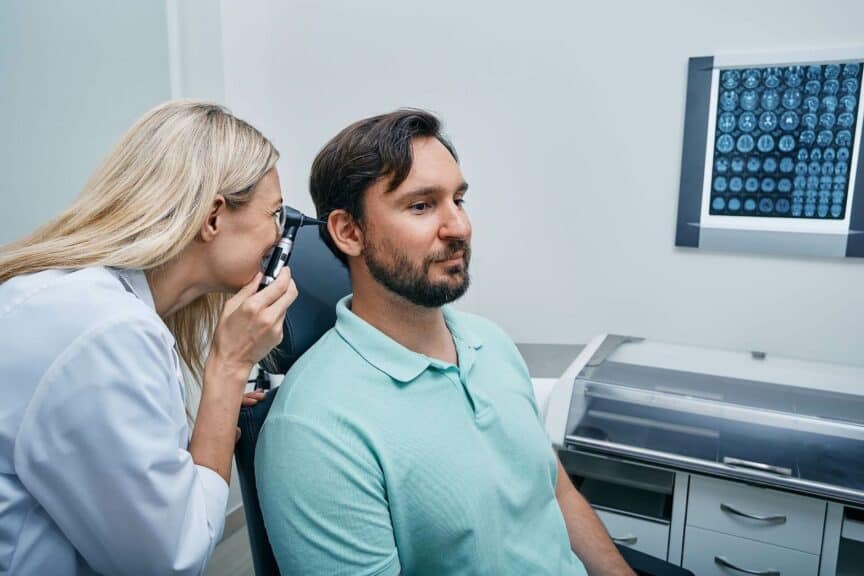Did you know that 1 in 8 people have some degree of hearing loss? Impacting over 48 million people, hearing loss is the third most pervasive health condition that people live with today. Practicing safety measures can significantly protect your hearing health and wellness. An effective healthy hearing habit that you can practice is scheduling an appointment for a hearing test. Hearing tests are painless, noninvasive, and straightforward. Learning more about your hearing is a great way to prioritize your health.
Who should have a hearing test?
The following statistics, provided by the Hearing Health Foundation, highlight the various demographics whose hearing is at risk:
- Over 30 million people are exposed to excessive noise.
- An estimated 22 million people are exposed to hazardous noise levels in the workplace.
- Musicians are 4 times more likely to experience hearing loss.
- Half of adults, ages 75 and older, have hearing loss.
This data reveals that millions of people are consistently absorbing loud noise. This is a common cause of hearing loss so if you work in a noisy setting, participate in activities that are noisy, regularly listen to music using headphones/earbuds – it is important to have your hearing evaluated. Additionally, aging is another common cause of hearing loss. So for adults, 60 and older, hearing should also be assessed regularly.
Who provides hearing tests?
There are a few types of specialists that facilitate hearing evaluations. This includes the following:
- Otolaryngologists: also known as ear, nose, and throat doctors; specialize in issues related to the ear, nose, throat, head, and neck areas.
- Audiologists: diagnose, treat, and manage conditions related to the hearing and balance systems.
- Hearing instrument specialists: licensed hearing healthcare providers who evaluate hearing loss and provide hearing aids.
If you are experiencing hearing related symptoms, your primary doctor may refer you to one of these specialists for follow-up.
Are there different types of hearing tests?
There are different types of hearing tests that are used to evaluate hearing health. Common tests include:
- Pure tone audiometry: this test involves wearing headphones that are connected to an audiometer which is a machine that plays sounds at different pitches and frequencies. Guided by a hearing healthcare specialist, you will indicate what you are able to hear by pressing a button or raising your hand. This will track the softest sounds that you are able to detect and the sounds that are more challenging for you to hear and process.
- Speech testing: similar to pure tone audiometry testing, speech testing involves playing speech rather than sounds. Live speech will be played at different volumes and you will indicate what you are able to hear. This is especially useful for understanding your hearing in relation to conversations.
These tests will identify the types of sounds and speech that you struggle to hear. The type of hearing loss and degree of impairment will also be identified.
How will I get my results?
Your results will be shared with you after your hearing test. Your hearing healthcare provider will show you an audiogram, a chart that visually shows your hearing loss. This will show the degree of impairment you are experiencing in each ear and the sounds and speech that are harder for you to hear. Your hearing healthcare provider will thoroughly discuss these details and let you know the treatment options that would be most effective. The most common treatment for hearing loss is hearing aids which are electronic devices that are used to absorb, amplogy, and process speech as well as sound. This provides the ears and brain with significant support, alleviating hearing loss symptoms and maximizing hearing capacity. If it is determined that hearing aids are the best course of treatment for you, your provider will recommend specific devices that are optimal for your hearing and lifestyle needs.
What can I expect after a hearing test?
The follow-up appointment to your hearing consultation is a hearing aid fitting. During this appointment, you will receive your hearing aids which are programmed with specific settings to meet your hearing needs. Your hearing aids will be fitted and calibrated, ensuring that they are comfortable for you. You will also learn everything about your hearing aids – how to insert and remove them, use them effectively, and how to maintain them so that they stay in great shape.
The hearing evaluation process is straightforward and informative. Through this process, you will receive effective treatment that transforms your hearing health and wellness!

